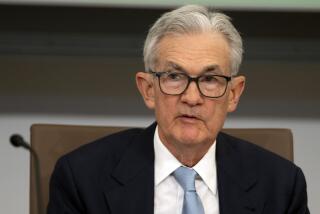Boom in Assets Key in Setting Policy, Fed Says
- Share via
The booming values of stocks and other financial assets have emerged as an increasingly powerful and unpredictable force in the economy, and even top monetary officials are at a loss to anticipate their movements, Federal Reserve Chairman Alan Greenspan said Friday.
Speaking at a Fed symposium in Jackson Hole, Wyo., Greenspan warned that the growing role of such assets as stocks and real estate is making the national economy increasingly vulnerable to sudden changes.
Greenspan once had warned of “irrational exuberance” on Wall Street, and he is legendary for his oblique, easy-to-misinterpret comments. All the same, some economists regarded his remarks Friday as a signal of the Fed’s deepening concern about the behavior of the economy and stock market.
Although Greenspan’s comments about stock prices in the past have sparked sharp, if temporary, sell-offs in securities markets, traders Friday reacted mildly to the speech. The Dow Jones industrial average fell 108 points in quiet trading, closing at 11,090.
But economists said Greenspan’s posture shows that, among other things, the Fed will be focusing attention increasingly on Wall Street as it monitors the economy for overheating and potential interest rate increases. What Greenspan and others appear to be asserting is that rising stock markets have had a key role in fueling spending in the booming economy, such as on home purchases, retail sales and business start-ups.
“We no longer have the luxury to look primarily to the flow of goods and services, as conventionally estimated, when evaluating the macroeconomic environment in which monetary policy must function,” Greenspan said. “There are important--but extremely difficult--questions surrounding the behavior of asset prices and the implications of this behavior for the decisions of households and businesses.”
Yet Greenspan suggested that economic policymakers still aren’t up to the task of anticipating swift, and potentially dangerous, declines in asset values and investor confidence.
“To date, economists have been unable to anticipate sharp reversals in confidence. Collapsing confidence is generally described as a bursting bubble, an event incontrovertibly evident only in retrospect. To anticipate a bubble about to burst requires the forecast of a plunge in the prices of assets previously set by the judgments of millions of investors, many of whom are highly knowledgeable,” he said.
But the Fed chairman said central bankers must put more effort into determining the links between stock market values and the real economy. He specifically said that further study is needed on something economists call the “wealth effect,” the link between rising investment holdings and consumer spending. Consumer spending accounts for fully two-thirds of the nation’s economic activity.
Sung Won Sohn, chief economist for Wells Fargo & Co. in Minneapolis, responded to Greenspan’s comments by saying, “The concern is this: The major driver of consumer spending right now is the stock market. Until and unless we can reduce some of that unwarranted enthusiasm in the stock market, we are not going to be able to slow consumer spending for a soft landing.”
Paul Kasriel, chief U.S. economist for the Chicago-based Northern Trust Co., added that the Federal Reserve is concerned about the stock market and real estate market because “the rise in the value of these assets could be supercharging the demand for goods and services in the economy, which could lead to higher inflation.”
In addition, Kasriel said, “perhaps there are some speculative excesses developing in these markets and that, when expectations are disappointed, you could see a very sharp decline in asset prices, and that could set off a very sharp decline in economic activity.”
Kasriel noted that U.S. homeowners have borrowed heavily against the value of their homes, a situation that he said makes their finances particularly vulnerable to a real estate downturn. In fact, Fed statistics show that homeowners’ equity, when considered as a percentage of the overall value of residential real estate, is at a post-World War II low.
To be sure, analysts in recent years have noted the effect of wealth on the economy. Yet analysts said Greenspan is suggesting that the wealth effect may be more influential than previously recognized.
As a result, Kasriel said, Fed policymakers are going to look beyond such areas as commodity prices, unemployment and the rate of economic growth. The Fed, he said, might start to pay more attention to asset values and borrowing levels when it decides whether to raise or lower interest rates.
Some economists interpreted Greenspan’s comments as a signal that the Fed may further raise interest rates this year. Two previous increases--this week and on June 30--have failed to dampen the Wall Street stock-buying “exuberance” about which Greenspan has expressed concern.
The Associated Press contributed to this story.
More to Read
Inside the business of entertainment
The Wide Shot brings you news, analysis and insights on everything from streaming wars to production — and what it all means for the future.
You may occasionally receive promotional content from the Los Angeles Times.










